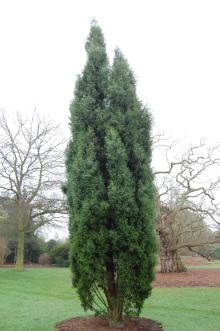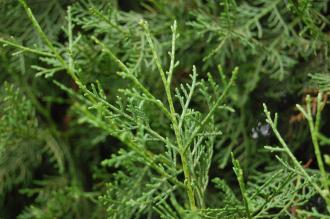
Cupressus dupreziana (06/01/2013, Kew Gardens, London)
Position: Full sun
Flowering period: Spring
Soil: Moist, well drained
Eventual Height: 20m
Eventual Spread: 10m
Hardiness: 9a – 10b
Family: Cupressaceae
Cupressus dupreziana is an upright evergreen tree. Its blue/ green leaves are scales and up to 1.5mm long. Its trunk may achieve a diameter of up to 3m. Its red/ brown bark has longitudinal fissures. Its yellow monoecious flowers are in the form of pollen cones, terminal, up to 6mm long and 3mm across. Its grey/ brown fruit cones are up to 2.5cm across. Its roots are wide rooting.
Cupressus dupreziana, commonly known as the Saharan Cypress or Tarout, is native to the mountains in the Central Sahara Desert. It has formed a unique population of trees which are hundreds of kilometers from other trees, of which there are only 233. Cupressus dupreziana is critically Endangered according to IUCN Red List of Threatened Species. It is considered to be one of the world’s 12 rarest tree.
The etymological root of the binomial name Cupressus is derived from the old Latin name for ‘Italian cypress’. Dupreziana is named after Captain Duprez, a commander of the French forces in the Djanet oasis at Fort Charlet and discoverer of this tree.
Although the distribution of this tree at present is extremely limited the landscape architect may find Cupressus dupreziana useful as an upright conifer tree similar to Cupressus sempervirens. Once established this tree is drought tolerant.

Cupressus dupreziana Leaf (06/01/2013, Kew Gardens, London)
Ecologically, Cupressus dupreziana is of little wildlife benifit in the UK.
Cupressus dupreziana prefers moist, fertile, well-drained soils. It tolerates most pH of soil.
Cupressus dupreziana requires little maintenance.

